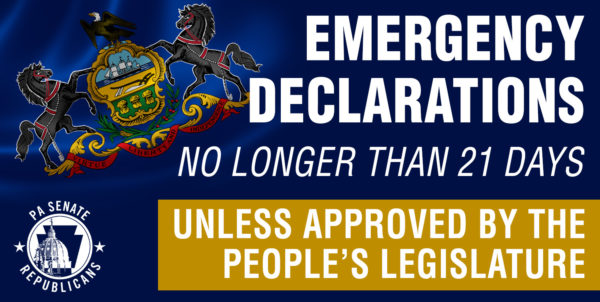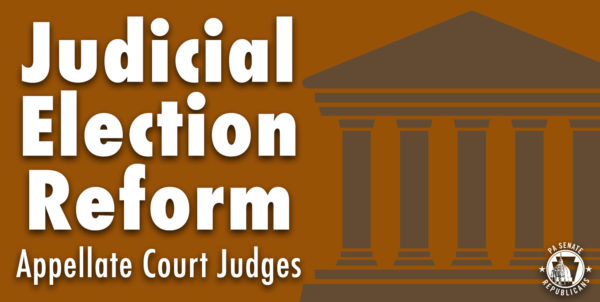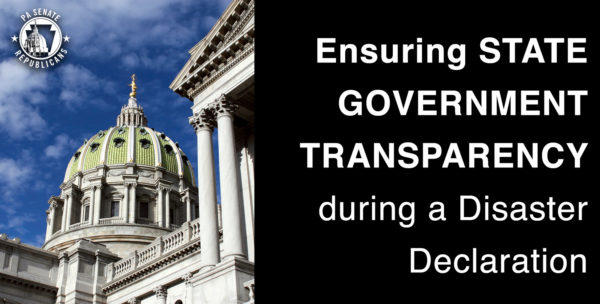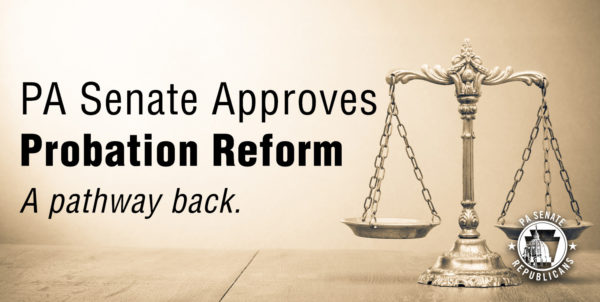
|
|
In This Update:
Constitutional Amendment to Limit Emergency Declarations Earns Senate Approval
The Senate voted in favor of a bipartisan bill this week that would amend the Pennsylvania Constitution to limit future emergency declarations and require legislative approval of any declaration lasting more than 21 days. The bill would create three separate ballot questions: one to limit emergency declarations, another to clarify the General Assembly’s authority to terminate or extend a disaster declaration without the governor’s approval, and a third to ensure equality under the law and prevent discrimination based on race or ethnicity. Because the bill would amend the state Constitution, it does not need to be approved by the Governor. Instead, it must be approved by the General Assembly in two consecutive legislative sessions before being approved by voters via referendum. Stefano Votes for Constitutional Amendment that Ends the Declaration of EmergencyHarrisburg – State Senator Pat Stefano (R-32) voted in favor of a proposed constitutional amendment today that would limit the length of future emergency disaster declarations unless an extension is approved by the General Assembly, moving the measure one step closer to a voter referendum. “This Governor has continually refused to work with the legislature during the pandemic and his draconian mandates have crushed our economy and continues to destroy the livelihoods of our small businesses. This amendment will ensure that in times of future crisis, the legislature will have the ability to claw back the power of any Governor.” Under current law, a governor’s emergency declaration can last up to 90 days and be renewed by the governor indefinitely. Under Senate Bill 1166, the emergency declaration would be limited to 21 days unless the General Assembly approved a longer duration. It also clarifies that the legislature is not required to present the resolution ending the declaration to the governor for his consideration. Senate Bill 1166 also provides for a constitutional amendment prohibiting the denial of equal rights based on race or ethnicity, bringing the Pennsylvania Constitution in line with the U.S. Constitution. Today’s Senate vote followed Tuesday’s approval by the House of Representatives, which amended the bill and returned it to the Senate. As a constitutional amendment, the legislation must be approved again in the next legislative session before being put on the ballot for voters to decide. Limiting the length of an emergency declaration would ensure greater cooperation between all branches of government during an emergency and restore the system of checks and balances that Pennsylvania’s government was founded upon. For four months, Governor Wolf has used the COVID-19 disaster declaration to suspend state statutes, spend taxpayer dollars without legislative approval, and keep millions of Pennsylvanians from earning a living through his business shutdown orders. His refusal to work with the General Assembly makes clear the critical need for this constitutional amendment. General Assembly Passes Constitutional Amendment Reforming Judicial Election Process
The Senate approved a potential amendment to the Pennsylvania Constitution this week to reform the process of electing appellate court justices. The bill would divide the Supreme Court, Superior Court and Commonwealth Court into judicial districts to ensure a broader range of regional interests are represented on Pennsylvania’s highest courts. Since judges are currently elected on a statewide basis, the majority come from the state’s two most populous counties, resulting in most of the state being underrepresented on the state’s highest courts. Dividing the state into judicial districts will end the current system of disproportionate representation and ensure the perspectives of all regions of the state are reflected in the makeup of the judicial branch. The Senate and the House of Representatives have each approved the bill, which does not require the governor’s signature. As a constitutional amendment, the legislation must be approved again in the next legislative session before being put on the ballot for voters to decide. Senate Approves Job-Creating Energy Tax Credit Program
A bill that could help create thousands of family-sustaining jobs and provide a boost to Pennsylvania’s energy economy earned bipartisan support in the Senate this week. The legislation would create a tax credit program to encourage companies that use dry natural gas to produce fertilizer and other petrochemical products to invest in facilities in Pennsylvania. The Local Resource Manufacturing Tax Credit Program would require a business to invest more than $400 million in a Pennsylvania facility and create at least 800 jobs in order to qualify for a tax credit. No tax credits would be awarded until at least 2025 – after the facility is completed and the jobs are actually created. The approach of the bill mirrors the Pennsylvania Resource Manufacturing tax credit, which was established during the 2012-13 budget and helped create thousands of jobs to construct the Shell Pennsylvania Petrochemicals Complex in Beaver County. Applications Available Now for Beginning Farmer Tax Credits
Experienced farmers will now have an incentive to sell or lease land, buildings and equipment to beginning farmers thanks to a new tax credit program that was created last year. Applications for the Beginning Farmer Tax Credit Program can be filed now at esa.dced.state.pa.us. Under the program, landowners will receive a one-time personal income tax credit for the sale or a multi-year lease of property. The legislation requires all leases be enforced through written agreements and that the sale of property be for fair market value in order to qualify for the tax credit. Complete program guidelines, eligibility, and application instructions are available here. Legislation to Restore Transparency in State Government Heads to the Governor
The Senate gave final approval to a bill this week that would restore transparency in state government by prohibiting the governor from directing a state agency to ignore records requests during an emergency declaration. The legislation would ensure Pennsylvanians can continue to access public records during a disaster declaration. The bill is retroactive to Governor Wolf’s March 6 disaster declaration. Governor Wolf has been widely criticized for failing to provide any sense of transparency during the public health emergency, including ignoring a subpoena for information related to his confusing and inconsistent waiver process for businesses that wished to remain open during the pandemic. Senate Votes for New Tool to Crack Down on Blight
Municipalities would have a new tool to crack down on dangerous abandoned and dilapidated properties under a bill approved by the Senate this week. The bill would allow municipalities to file condemnation orders on the properties with the county recorder of deeds. The order would be considered a lien on the property and its validity would not be impacted by upset, judiciary, or repository sale of the property. Under current law, anytime a condemned property’s ownership changes hands, local officials must expend significant time repeating their code enforcement process. This bill closes that loophole and allows municipalities to take the appropriate steps to remove these dangerous eyesores from our communities. Senate Passes Bipartisan Probation Reform Proposal
A bipartisan bill to improve Pennsylvania’s probation system received the unanimous approval of the Senate this week. The bill would give the courts stronger guidelines and restrictions on sentencing to ensure periods of incarceration are limited to individuals who commit new crimes or serious violations. The bill also creates incentives for probationers to succeed through credits for good behavior, such as maintaining a job and performing community services. In current practice, technical violations that are not actual crimes – such as being late for an appointment, traveling out of state or being unable to pay fines and restitution – can lead to extensions of probation or prison time that far exceed the original sentence handed down at trial. The cost to incarcerate these individuals is much greater than the cost of supervision, resulting in wasted taxpayer dollars without any benefit in terms of public safety. Bill Would Provide Greater Flexibility in Obtaining Teacher Certifications
The COVID-19 pandemic created a severe disruption in the certification process for teachers, as testing centers were closed statewide. The Senate approved a bill this week that would help teachers, recent graduates, undergraduate students and paraprofessionals to navigate the state required certification process. The legislation will enable graduates to obtain temporary certifications and extend certain deadlines to provide additional flexibility so schools are not faced with additional challenges in recruiting staff when reopening schools. New Laws Support Police Reform, Child Safety, Blight RemediationSeveral noteworthy bills that were approved by the Senate recently were signed into law this week, including:
|
|
|




2024 © Senate of Pennsylvania | https://www.senatorstefano.com | Privacy Policy |







